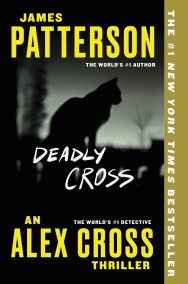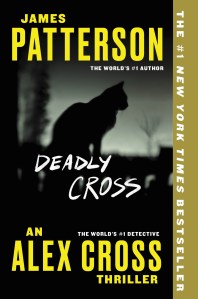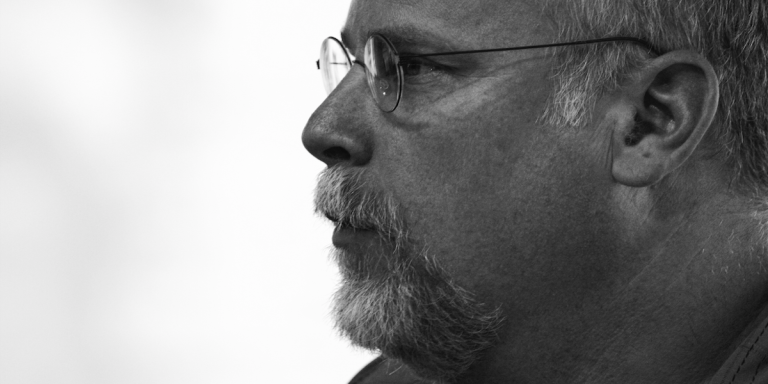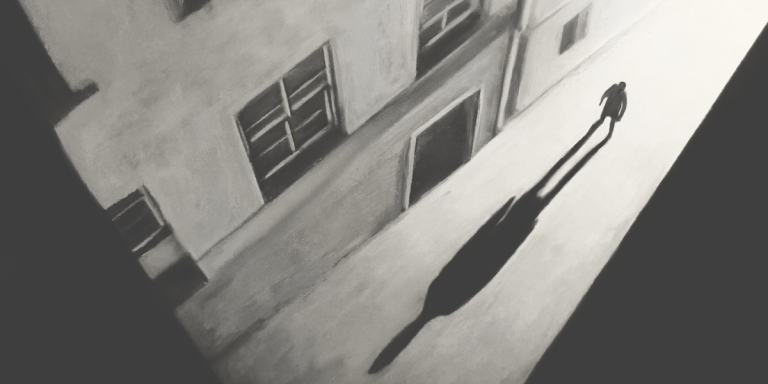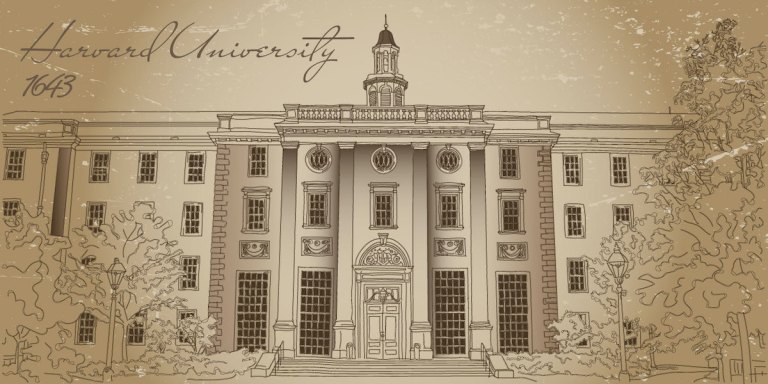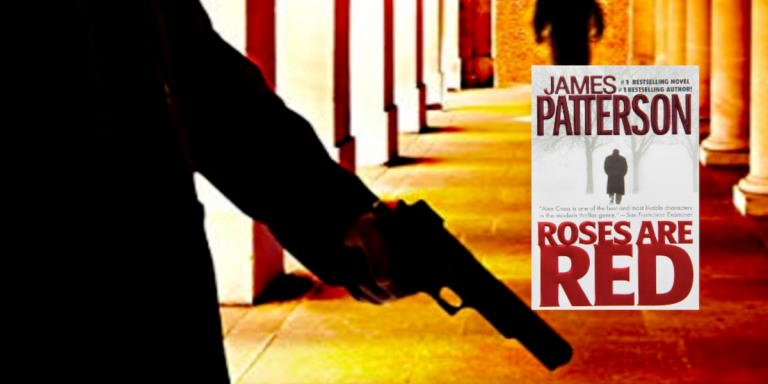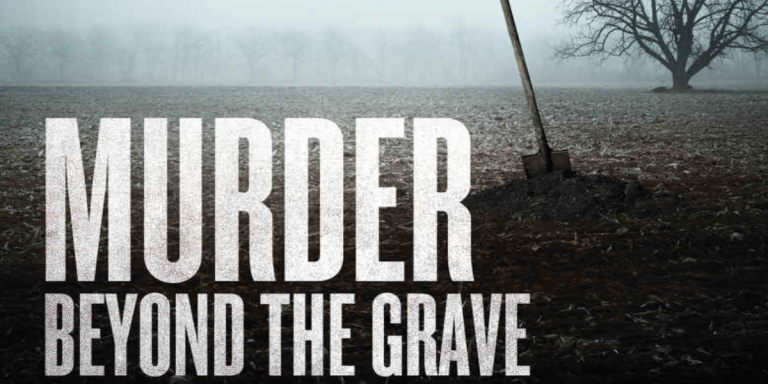The Newest Alex Cross Novel: Deadly Cross
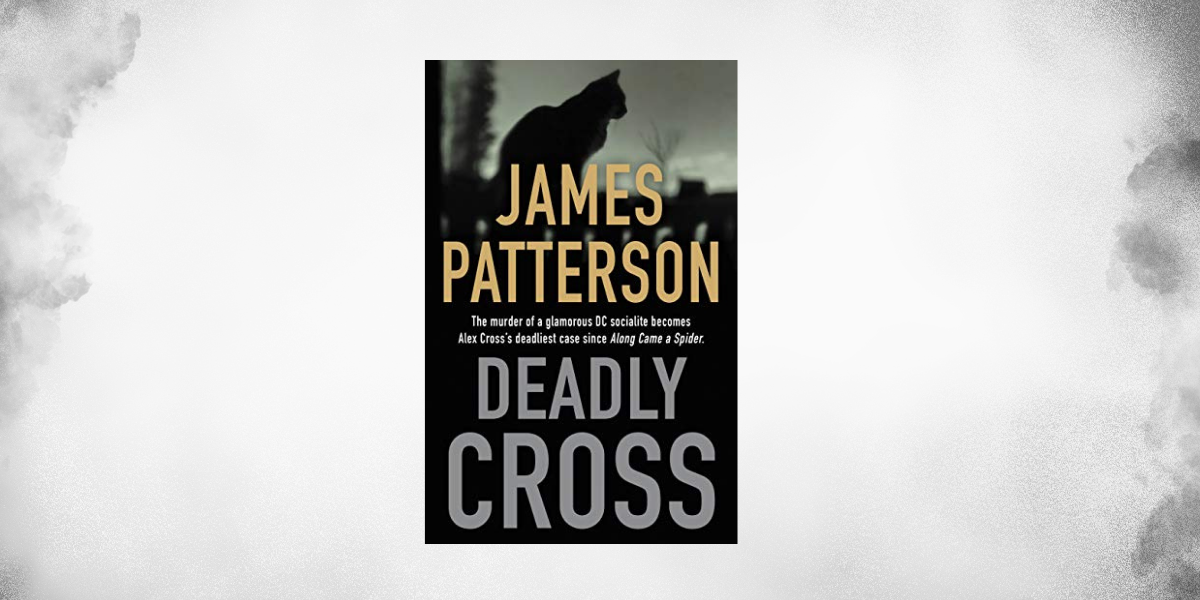
Copyright © 2020 by James Patterson
Chapter 1
Devon Monroe tore his eyes off the two dead bodies in the powder-blue Bentley convertible, top down, idling not twenty yards away, and glanced at his best friend.
“No movement,” Devon said.
“Lights out,” said Lever Ashford, nodding.
“I don’t know, Lever. This is high profile. Know what I mean?”
Lever said, “C’mon, Dev. It’s a once-in-a-lifetime, straight-up gift from God on top of everything else. We slip in. We slide out. See Waffles. No one knows.”
“I’m telling you, damn white folks get hung for less. Now let’s get out of here.”
Lever snarled, “You owe me, brother, or have you forgotten?”
The young men were both sixteen, African-American, and had their dark hoodies up. It was four fifteen in the morning, and they were standing in the shadows cast by the Harrison Charter High School in Garfield Heights in Southeast Washington, DC. The parking lot behind the school was dead silent except for their whispers.
Devon grimaced, struggled, but finally said, “Just don’t get prints on nothing.”
“Why we got them,” Lever said, smiling as he groped in his back pocket for two pairs of thin surgical gloves.
They put them on, scanned the area, and saw no movement anywhere around the school, not in the parking lot or on the track and football field.
“Forty-five seconds and we’re gone,” Devon said. “I’m serious.”
Lever bumped his fist. “Forty-five.”
They walked right up to the Bentley, Lever at the driver’s door, Devon going around to the other side. He skidded to a halt by the passenger door, feeling not fear but horror. “I don’t know if I can do this, man.”
“Do it! Take what’s rightfully yours, brother!”
Chapter 2
Devon felt like he might puke but took one step, leaned over, and reached into the back seat, not letting his shirt or pants touch the Bentley in any way.
He tried to keep his eyes off the woman sprawled there, half naked and dead. Lever, however, stared right into the eyes of the dead man lying next to her as he slipped his surgical-gloved hand into his tuxedo jacket. He looked at the man’s pants around his ankles, sniffed disdainfully.
“Freak bastard,” Lever said. “Serves you right, getting shot like this.”
On the other side of the Bentley, Devon smelled a coppery odor and it sickened him. Blood, he thought, trying not to breathe through his nose as he felt for the woman’s hands, found a big-rock ring, and worked it off her finger. The bracelets, two on the left, one behind the watch on the right, came off quicker than he’d expected.
Devon was about to call it good when he saw the pale glow of the pearl necklace around her neck. He tilted her head forward, found the clasp, slipped it off, and slid it into his pocket.
“Thirty-eight seconds,” Lever whispered from the other side of the car. “I’m done. Watch and wallet.”
“Right behind you,” Devon said. He tugged the pearls from the dead woman’s ears and laid her head back on the seat.
“Alley now,” Lever said, pivoting.
They heard scuffling in the gravel behind them. They took off at a sprint and dodged through a hole in the fence into a dark alley, where they stopped to look back. Someone was heading toward the car.
They ran the length of the alley, slowed to a walk across Alabama Avenue, then kept on at a faster pace toward Fort Circle Park. Forty minutes later, as the boys were reaching home, they heard sirens begin to wail back at the school.
Chapter 3
It was seven thirty in the morning, and I was standing at the bottom of a granite cliff on Old Rag Mountain in Shenandoah National Park, looking dubiously up at the cracks in the wall and the ropes dangling beside them.
“Biggest one yet, Dad!” said my ten-year-old son, Ali, who stood to my right wearing a white rock helmet and a climbing harness over his T-shirt and shorts.
“You think?” his sister said. Jannie, my seventeen-year-old, was kneeling to my left, retying her climbing shoe.
The man beside her, who was going through a knapsack, said, “Definitely. It’s six stories and technically more challenging. And the rappel down’s a screamer.”
“It’s a screamer, Dad!” Ali said.
“No screamers,” I said. “As far as I’m concerned, if you’re screaming, you’re falling, so no screamers.”
“Sorry, Dr. Cross,” the man said, setting the bag down. “It just means you can take bigger leaps before you tighten up on the rack coming down.”
“I’ll be good, Tom, and locked into my rack, thank you,” I said.
Tom Mury grinned and clapped me on the back. “It’s just cool to see someone like you willing to go on rope.”
“Someone like me?” I said.
“Six two? Two twenty-five? Forties?”
“With all the hiking we’ve been doing, I’m two twenty.”
“It’s still impressive to see a guy your size going up.”
“He is at a disadvantage,” Ali said. “So is Jannie.”
“Nope,” my daughter said, standing. “I’m stronger and got longer arms and legs than you do.”
“Helps to be small and crafty if you want to be a human fly,” Ali said.
“Sometimes,” Mury said. “Who’s up first?”
For the past four days, we’d been taking a course with Mury, who was a certified rock-climbing instructor. It was Ali’s idea, of course, the newest of his obsessions, and Jannie had expressed interest in it right away.
To be honest, I had been less enthusiastic, but with Jannie entering her senior year of high school in two months and her college years looming, I was trying to lead a more balanced life, focusing more on my family and less on murder and mayhem. So I agreed to join them.
We’d been bouldering and climbing less sheer rock for the past two days. Though we’d all spent time prior to the course learning the basics in a climbing gym in Northern Virginia, this would be the first time we had climbed an actual cliff.
“I’ll go!” Ali said, stepping forward.
“Sisters first,” Jannie said.
“Dad?”
“She’s up.”
While my son pouted, Jannie went to the rope and watched Mury intently as he linked her to the line with a small mechanical device called a jumar that was already tied to her harness. The jumar would allow the rope to slip through only when Jannie ascended. If she fell off the rock, the device would lock her in place on the rope.
“Just like we talked about yesterday,” Mury said. “We’re not trusting the jumar, are we?”
“I’ll work the Prusik knot, too, and the cow’s-tail all the way up.”
He picked up the other rope and called, “On belay.”
Jannie turned all business, said, “On rope. Climbing.”
Chapter 4
Watching your child climb a sheer face, even roped in, is an experience somewhere between breathtaking and panic-inducing. At least that’s how I felt seeing Jannie boldly ascend the cliff, sure with her hands and feet, using her safety gear exactly the way Mury had taught us.
“Great job!” Mury called when she disappeared over the top.
Ali and I clapped and whistled, and unseen high above us, Jannie let loose a scream of triumph.
“I’m on now!” Ali said.
My son was less sure as he climbed, but every time he stalled and tried to figure out his next move, Mury would shout up some encouragement or instruction. Twenty minutes after he began, Ali disappeared over the top.
“I am the human fly!” I heard him shout.
Mury laughed. “Your kid’s a piece of work, Dr. Cross.”
“Call me Alex, and he is that.” I chuckled. “He never ceases to amaze me.”
“Ready, Alex?”
My stomach did a little flip-flop, I’ll admit it. Heights aren’t my thing, but once I commit to something, I commit.
“As I’ll ever be,” I said, going to the rope.
Mury helped rig me. As I climbed, I’d work the jumar on the main line and the Prusik knot on the rope beside it. Like the mechanical device, the knot allowed a rope to pass through only in one direction. Any weight on the safety rope attached to my harness, and the knot would cause it to cinch tight. In the unlikely failure of the jumar, the Prusik would save me a long and potentially fatal fall.
“Enjoy yourself, Doc,” Mury said. “On belay!”
“On rope!” I called back. “Climbing.”
I made it to the top, and I wish I could say it was through a series of well-calculated and smoothly executed moves, but it wasn’t. My climb was tentative and clunky, and I was immediately aware that my hip and shoulder joints weren’t as loose as they needed to be.
“You’re killing it,” Mury called to me when I’d gotten up twenty feet.
“Doesn’t feel like it.”
“What do you need?”
“How about a crash course in yoga?” I said, sweat pouring off me.
“Look for hand- and footholds in your range of motion,” he said. “Remember, not everyone climbs the exact same route. This is about you adapting to the wall.”
“C’mon, Dad!” Ali called.
“You got this!” Jannie cried.
I looked up to see them still some three stories above me, peering over the edge of the cliff. They had such joyous grins on their faces that I was inspired to keep climbing, slow and steady, trying to do everything by the book.
At forty feet, I said, “My hands are cramping. Gimme a second to rest.”
“Use your cow’s-tail,” Mury said. “Tie into that wall nut on your right.”
I reached around, grabbed the short rope with a carabiner dangling off my right hip, and clipped it to the loop of steel linked to a block of steel jammed into a crack in the cliff. Now supported by three lines, I could relax a minute and stretch my fingers and knead my palms.
“How’s the view?” Mury said.
I looked over my shoulder at the lower flanks of the Blue Ridge Mountains, a perfect sea of midsummer green shimmering in the morning light behind and below me. It was kind of thrilling, I decided, to be dangling off the side of a cliff for no reason, enjoying the beauty of nature. I smiled, looked down, and said, “Okay, I’m starting to get the attraction of this.”
Our instructor threw me a thumbs-up, said, “I told you—it’s an acquired taste and then an addiction.”
I doubted the latter would be the case, but I enjoyed the rest of the climb, finding myself thinking more about the mechanics of it than the dangers. A half an hour after I left the ground, Mury’s assistant, Carley Jo Warner, helped me up over the edge.
“Well done,” she said.
“I almost dislocated my hip a few times, but thanks,” I said, gasping. I sat still as she disconnected me from the ropes. When she was done, I lay down on my back with a silly grin on my face.
“Wasn’t that great?” Ali said, giving me a high five.
“Not at first,” I said. “But yes, eventually it was fun.”
“I can take you to a yoga class, Dad,” Jannie said.
“I’m not exactly built to be a human pretzel, but I’ll think about it.”
Before either of them could reply, my cell phone rang, which surprised me, as we’d had no service at the bottom of the cliff.
I got it out of my shirt pocket and saw my wife, Bree Stone, was calling from her DC Metro Police phone. Bree was chief of detectives and had been under a lot of stress lately.
There’d been a string of unsolved rapes and murders in the DC area, and in just the past week, in two separate incidents, two vocal and well-connected lobbyists had been shot at in Georgetown. To make it worse, there was a new commissioner of police, and everyone’s job, including Bree’s, was on the line.
I got to my feet and answered on the third ring. “Human fly here.”
Bree said, “We’ve got a double homicide, and I want you involved.”
“Why?”
“You know both victims,” she said, and she gave me their names and location.
I felt my stomach lurch and my knees wobble in disbelief and grief. In my mind, I saw them both as I’d last seen them, felt their loss like a blow to the head.
“I’m sorry, Alex.”
“Thanks. I’ll use the bubble and be there in two hours, tops.”
“I won’t be there. Another meeting with the commissioner.”
“Hang tough. You’re still the woman for the job.”
“We’ll see,” she said, and she hung up.
I looked at my kids. “Sorry, guys.”
“It’s okay,” Jannie said. “We’ve had three and a half days and lots of fun.” Ali nodded, and somehow their understanding made me feel even worse about cutting our time short.
“We will be back,” I promised, then I looked at Mury, who’d just reached the top. “Can you teach us how to do screaming rappels? We have to go.”
“Screamers.” Mury smiled. “I can do that.”
Chapter 5
The feeling of leaning away from the cliff, pushing off the rock face, releasing my grip on the rappelling rack, falling a good fifteen feet before my boots hit the wall, then starting the whole process over again was still with me when I got out of my car and headed up the block toward the police lines.
It was July in DC, but it was strangely cool, low seventies, low humidity, with a brisk breeze. The school came into view, shut and empty for the summer. Jannie went to Harrison, and when I saw the circus of media satellite trucks around the school grounds, it made the scene that much more upsetting.
I skirted the trucks and pushed my way through the onlookers, hearing but trying to ignore the vicious gossip and speculation already spreading about the victims and the heinous crime.
In the past I had been both an FBI agent and a DC Metro Homicide detective, and now I was a consultant for both agencies. I showed my identification to the uniformed officer restricting entry to the crime scene, and he let me duck under the tape.
I made it fifteen yards before an FBI agent asked me for my ID. I gave him my FBI contractor’s badge, and he waved me through. John Sampson, my best friend and former partner at DC Homicide, came around the corner.
“FBI?” I said.
“Given the victims, not surprising.”
“Right, but who’s in charge?”
“Mahoney. He wants you to look at the bodies before they’re moved.”
“How bad?”
“They weren’t shot in the face. You’ll recognize both.”
We walked around to the lot in the rear of the school, and I saw an FBI forensics van and a DC medical examiner’s vehicle parked by the football field and track where my daughter had run some of her finest races. There were at least twenty agents prowling the lot, looking for any and all evidence. I could see a team of them on the field.
“Who found them?” I asked.
“School security guard,” he said, gesturing toward dumpsters with yellow police tape around them. “They’re out back.”
I said, “Time of death?”
“ME says four a.m.”
We went over to the dumpsters to find the familiar powder-blue Bentley convertible cordoned off by more police tape, and agents, criminologists, and police detectives milling around the area.
FBI Special Agent in Charge Ned Mahoney, my old partner at the Bureau, separated himself from the pack, came over, and shook my hand. “We’ve been waiting on you, Alex. It’s been photographed but not scoured by forensics yet.”
“Okay,” I said. “Can I get some breathing room?”
Mahoney clapped and yelled, “All right, now, everyone back off, we need the scene to ourselves for a moment.”
We got odd glances, but they walked off.
I took in the Bentley convertible and the victims in the back seat, and part of me wanted to sit down and cry. But I’d spent the majority of my adult life confronting murder, and there was only one way to do it well: divorce yourself emotionally from the victims. In this case, that was going to be difficult.
Mahoney, seeming to read my thoughts, said, “You sure you’re up to this?”
“I’ll deal with it,” I said as I walked around the car toward the female victim.
I wanted to treat her as an object to be studied and evaluated, but I was having a hard time taking my eyes off Kay Willingham’s face. She was one of the most striking, most interesting women I’d ever known, and here she was dead, sprawled next to a man who had apparently been her lover, unlikely as that seemed.
I had to force myself not to look at her blank expression and instead focus on the two bullet wounds about four inches apart and two inches above her bare left breast. Her rose-lace bra was on her lap; her black dinner dress was tugged down around her waist.
“No sign she had her hands up in a defensive posture,” I said. “I’m thinking she never saw her killer.”
“Neither did he,” Sampson said from the other side of the car. “I think they had other things on their minds.”
Only then did I look at the male victim. He was turned slightly toward Kay, his head slumped on his right arm, which was extended over the compartment that held the convertible’s retracted roof. His pants and boxers were around his ankles. Blood from two chest wounds had drained across his left thigh and pooled between his legs.
“The press is going to have a field day with this,” Sampson said.
“For way too many reasons,” Mahoney said.
I didn’t reply, but Ned and John were right; there were so many reasons for this to blow up, and in ways we couldn’t predict.
Kay Willingham was a vivacious Georgetown socialite, a Southern heiress and power broker who had, until two years ago, been married to J. Walter Willingham, the current vice president of the United States.
The man with her, Randall Christopher, was the founder and principal of Harrison Charter High, a charismatic man rumored to have his eye on the mayor’s office and, if that went well, higher political aspirations. Christopher was African-American and married with twin girls who were sophomores at his school and friends of my daughter.
“Look at that,” I said, shaking my head.
“What?” Sampson and Mahoney said.
“We might be witnessing the birth of a perfect shitstorm.”
Chapter 6
Before either of them could respond, two men in dark suits and shades ducked under the tape.
“Spin around, whoever you are,” Mahoney barked. “And get off my crime scene.”
They both held up badges. The taller of them, the one with the buzz cut, said, “Donald Breit, U.S. Secret Service.”
“Lloyd Price, U.S. Secret Service,” said the other, who was built like a brick with powerful legs and arms. “You are?”
“FBI Special Agent in Charge Mahoney,” Ned snapped. “Now get off my crime scene.”
Agent Price took off his shades, his face softening. In a quieter voice, he said, “Please, sir, and no disrespect, but Kay Willingham is—was—our boss’s ex-wife.”
Agent Breit removed his sunglasses as well, revealing bloodshot eyes. “He’s crushed, the VP. I’ve never seen him like this. As soon as he heard, he asked us to come down. To find out what we could, Special Agent Mahoney. I know it’s crazy…but he still loves her.”
Kay Willingham led a life as glamorous as it was public-she was a gorgeous Georgetown socialite, philanthropist, and the ex-wife of the vice president. So why was she parked in a Bentley convertible idling behind a DC private school, in the middle of the night, with the man who was the head of that school? Who shot them both, point blank, and why? The shocking double homicide is blazed across the internet, TV, newspapers—and across Alex Cross’s mind. Kay had been his patient once. And maybe more.
While John Sampson of DC Metro Police investigates the last movements of Christopher Randall, the educator killed along with Kay Willingham, detective Alex Cross and FBI special agent Ned Mahoney find unanswered questions from Willingham’s past, before she arrived in DC and became known in DC society as someone who could make things happen. They travel to Alabama to investigate Kay’s early years. There they find a world of trouble, corruption, and secrets, all of them closed to outsiders like Cross and Mahoney.
Kay had many enemies, but all of them seemed to need her alive. The harder the investigators push, the more resistance they find when they leave behind the polite law offices and doctors’ quarters of the state capital. Alex Cross will need to use all his skills as a doctor, a detective, and a family man to prevent that resistance from turning lethal…again.
By clicking 'Sign Up,' I acknowledge that I have read and agree to Hachette Book Group’s Privacy Policy and Terms of Use
